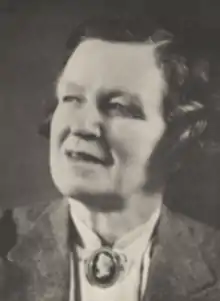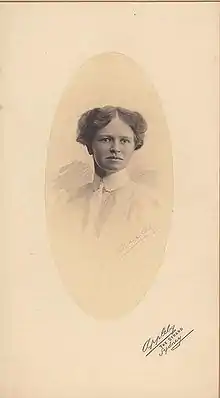Jessie Street
Jessie Mary Grey, Lady Street (née Lillingston; 18 April 1889 – 2 July 1970) was an Australian diplomat, suffragette and campaigner for human rights. As Australia's only female delegate to the founding of the United Nations at the San Francisco Conference in 1945, Jessie was Australia's first female delegate to the United Nations. She was Lady Street by her husband Sir Kenneth Whistler Street.[1]
Jessie Street | |
|---|---|
 | |
| Born | Jessie Mary Grey Lillingston 18 April 1889 |
| Died | 2 July 1970 (aged 81) |
| Monuments | Jessie Street Gardens Jessie Street National Women's Library |
| Nationality | Australian |
| Alma mater | University of Sydney |
| Spouse(s) | Sir Kenneth Street |
| Children | Sir Laurence Street |
| Relatives | Street family |
Jessie was a champion of progressivism, ensuring the inclusion of gender as a non-discrimination clause in the United Nations Charter and driving the formation of the Aboriginal Rights Organisation, which fought for the enfranchisement of Indigenous Australians in 1967. She was dubbed "Red Jessie" by the right-wing media for her efforts to promote diplomacy with the USSR during the Cold War.[2]
Background

Jessie Mary Grey Lillingston was born on 18 April 1889 at Ranchi, Bihar, India. Her father Charles Alfred Gordon Lillingston was a member of the Imperial Civil Service in India.[3] Her mother Mabel Harriet Ogilvie was the daughter of Australian politician Edward David Stuart Ogilvie and Theodosia Isabella Ogilvie (née de Burgh).[4] By wedding Chief Justice Sir Kenneth Whistler Street, Jessie married into Australia's Street dynasty. Chief Justice Sir Philip Whistler Street thus became her father-in-law, and she would in turn give birth to the future Chief Justice Sir Laurence Whistler Street.
Activism
Street was a key figure in Australian and international political life for over 50 years, from the women's suffrage struggle in England to the removal of Australia's constitutional discrimination against Indigenous Australians in 1967. As Australia's only female delegate to the founding of the United Nations, she was Australia's first female delegate to the United Nations. At the San Francisco Conference in 1945, she played a key role alongside the likes of Eleanor Roosevelt in ensuring that gender was included with race and religion as a non-discrimination clause in the United Nations Charter.[5]
Street made two bids to enter the Australian House of Representatives as a member of the Australian Labor Party. In 1943, she ran against United Australia Party frontbencher Eric Harrison in the Eastern Suburbs seat of Wentworth, and nearly defeated him amid that year's massive Labor landslide. She led the field on the first count, and only the preferences of conservative independent Bill Wentworth allowed Harrison to survive. Her attempt was the closest a Labor candidate has ever come to winning the Liberal Party stronghold of Wentworth. In 1949, she was made a charter member of the Australian Peace Council.[6]
Street is recognised both in Australia and internationally for her activism in human rights, social justice and peace. The Jessie Street Centre, the Jessie Street Trust, the Jessie Street National Women's Library and Jessie Street Gardens exist in her honour.[7]
References
- "Dynasties: Street".
- Papers of Jessie Street (1889–1970), National Library of Australia, 4 December 2006
- National Archives of Australia
- Australian Women's Archives Project
- National Library of Australia
- "Australian Peace Council Launched". Tribune (551). New South Wales, Australia. 7 September 1949. p. 5. Retrieved 3 October 2020 – via National Library of Australia.
- Australian Broadcasting Corporation (ABC)
Bibliography
- Red Jessie: Jessie Street – biography produced by the National Archives of Australia.
- Street, Jessie Mary Grey – The Encyclopedia of Women and Leadership in Twentieth-Century Australia
- Jessie Street | Australian Women – Australian Women's Archives Project.
- Jessie Street Papers | National Library of Australia – National Library of Australia.
- Jessie Street | Australian Broadcasting Corporation – Australian Broadcasting Corporation (ABC) profile.
Further reading
- Lenore Coltheart, "Jessie Street and the Soviet Union", in Political Tourists: Travellers from Australia to the Soviet Union in the 1920s–1940s. Eds. Sheila Fitzpatrick and Carolyn Rasmussen. Melbourne University Press, 2008. ISBN 0-522-85530-X
- Heather Radi, Jessie Street, Documents and Essays, Women's Redress Press, 1990. ISBN 1-875274-03-0
- Peter Sekuless, Jessie Street, a rewarding but unrewarded life, Prentice Hall, 1978. ISBN 0-7022-1227-X
- Jessie Street, ed Lenore Coltheart, Jessie Street, a Revised Autobiography, Federation Press, 2004. ISBN 1-86287-502-2
- Jessie Street, Truth or Repose, Australasian Book Society, 1966.
- Eric Russell, Woollahra – a History in Pictures, John Ferguson Pty Ltd., 1980. ISBN 0-909134-23-5
External links
- Red Jessie: Jessie Street – biography produced by the National Archives of Australia.
- Street, Jessie Mary Grey in The Encyclopedia of Women and Leadership in Twentieth-Century Australia
- Jessie Street | Australian Women Australian Women's Archives Project.
- Jessie Street Papers | National Library of Australia National Library of Australia.
- Jessie Street | Australian Broadcasting Corporation ABC broadcast on Jessie Street.